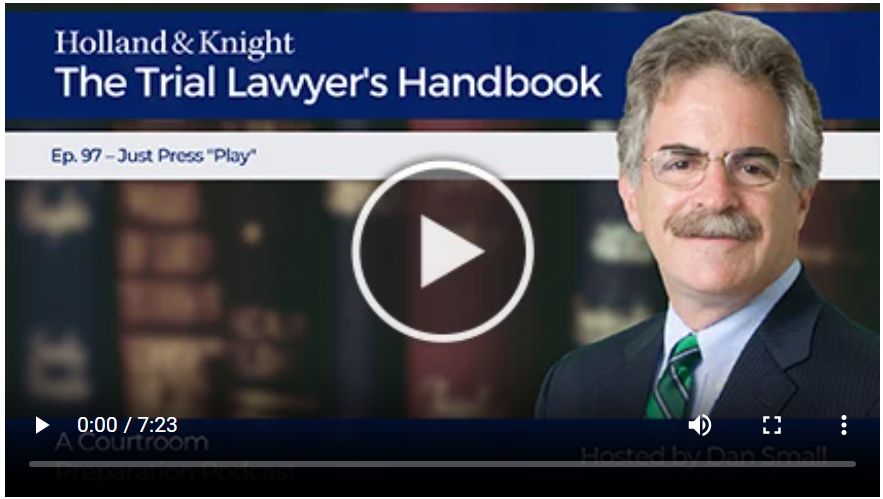- in United States
In this episode of "The Trial Lawyer's Handbook" podcast series, litigation attorney Dan Small highlights the critical role voice recordings can play in court. He details three primary ways to obtain recordings: wiretaps, undercover agents and cooperators. Drawing on his experience investigating drugs and corruption in Appling County, Georgia, Mr. Small shares how he enlisted a trusted cooperator to capture incriminating conversations — an approach that proved highly effective. This insightful episode explores why and how this strategy can lead to success.
This podcast episode was adapted from Mr. Small's book Lessons Learned from a Life on Trial: Landmark Cases from a Veteran Litigator and What They Can Teach Trial Lawyers.
Podcast Transcript
Dan Small: Testimony about past conversations can be tough. Think about it. If a witness testifies, "The defendant said X," the jury has a long road to travel before they really get to "X." Is the witness telling the truth? Does a witness have reason to lie? Was the witness serious or joking? Was "X" serious or joking? Did they hear it accurately? Do they remember it accurately? And so much more, all before they even get to "X."
But what if you could cut out all that interference and just hear the defendant say "X" directly in their own voice, in their words? That's the power of tape recordings in an investigation. The jury gets to hear it as it really happened and how it really happened. Done right, it can be overwhelming to the defense in trial.
There are basically three ways the government can obtain tape-recorded evidence, each with its own pros and cons. First is by a wiretap, a microphone planted in a particular place or on a particular phone, generally by a court order. This could be very productive, but it can require a great deal of resources to monitor it and it can be very hit or miss. You have to put the bug in the right place at the right time because you lose out if the targets go somewhere else or use another phone.
Second is by an undercover agent, someone who is trained and understands both what is needed to bring a case and what the limits are on what they do or say. However, infiltrating a criminal organization with an undercover agent is tough. It's risky, and it's time consuming. And even once inside, the undercover agent will often never get the same level of trust as longtime members of the group.
The third way is with a cooperator, someone who is part of the criminal activity but agrees for one reason or another to turn and cooperate with the government. Here, the trust of the others is presumably there, but the training is not. The cooperator is unlikely to know when he has said or done the wrong thing, when he has gone too far or when he has created evidence that may help the defense. And the cooperator, himself or herself, will likely be subject to cross-examination for their own deeds.
In the investigation into drugs and corruption in Appling County, Georgia, that we've been talking about in the last several episodes, as a prosecutor with the U.S. Department of Justice's Organized Crime Strike Force in Washington, D.C., we had the best of both worlds. When we confronted and turned one of the corrupt deputy sheriffs, we were able to develop a witness who moved freely with the targets, who was completely trusted since they'd all grown up together and who had enough law enforcement training to understand what we needed while also knowing what the limits were. The results were extraordinary.
One of my favorites was a tape that was recorded when the deputies went to drug kingpin Larry Jackson's house to voice their concerns about the investigation. Jackson's house was out in the countryside. It was quiet. You could even hear the bourbon splashing into the glasses as Jackson poured them each a drink to settle their nerves. Jackson sought to reassure them by reminding them how much money they had made with him and would continue to make once the investigation blew over. But the conversation really got good when they started talking numbers.
Jackson had been giving the bribe money to the sheriff and relying on the sheriff to give the deputies their share, except he hadn't. As the Bible says, there is no honor among thieves. The sheriff had been giving the deputies less than he and Jackson had agreed and pocketing the difference. When Jackson asked the deputies how much they had been paid for the different plane loads, he was furious. "You've been effed," he shouted. "You've been effed bad." The power of tape recording. To help the deputies understand what a good guy he was and how badly the sheriff had cheated them without his knowledge, Jackson called his wife Suzette, who was also his bookkeeper, into the room and angrily went through some of the drug loads with her. "I paid g*****n Sheriff Lightsey 30 g*****n thousand dollars for the Reidsville load, and he was supposed to pay each of you five g*****n thousand." I don't have the transcripts anymore so the numbers may be off, but you get the idea. And on it went, laying out the bribery payments in angry, excruciating detail corroborated by the bookkeeper who is standing right there. All because the sheriff had cheated his friends. How does the defense argue against a tape like that before a jury? They couldn't.
We had, of course, provided the tapes and transcripts to defense counsel before trial, but tape cases were rare in Georgia at the time. And I'm not sure defense counsel, even experienced as they were, fully understood the power of their clients' own voices filling the courtroom with open talk of drugs and bribes. In opening statements, several defense counsel attacked the government's case as groundless, promised the jury that when it came to their turn, their clients would take the witness stand and tell the jury what really happened. It was a promise they couldn't keep.
By the end of the government's case, they understood the power of tapes, the impact on the jury and the impossibility of contradicting what the jury had heard with their own ears. They realized that for each of the defendants, if they took the witness stand, my cross-examination would be "just press play," and they would have to relive the nightmare. Eleven defendants went to trial. In the end, only one of them, a minor player who had not been recorded, who we'll talk about later, took the stand. The rest had witnessed the power of tapes in court and it sent them to jail. Just press play.
The content of this article is intended to provide a general guide to the subject matter. Specialist advice should be sought about your specific circumstances.


